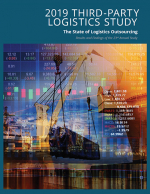2019 Third-Party Logistics Study: The State of Logistics Outsourcing
The 2019 23rd Annual Third-Party Logistics (3PL) Study examines the global outsourced marketplace and leading trends for shippers and 3PLs in the logistics industry.
The 2019 23rd Annual Third-Party Logistics Study shows that shippers and their 3PL providers are increasingly moving toward meaningful partnerships and working together to accomplish their supply chain goals.
Both parties appear to have a much greater awareness of what they’re trying to accomplish as well as the ways in which the availability of data and the use of technology can help them progress.
The study shows that the majority of shippers - 91% - report that the relationships they have with their 3PLs generally have been successful.
A higher number - 98% - of 3PLs agree that their customer relationships generally have been successful.
Among respondents of the 2019 study, 89% of shippers and 98% of 3PL providers agree that the use of 3PLs has contributed to improving services to the ultimate customers.
Additionally, 73% of 3PL users and 91% of 3PL providers agree that 3PLs provide new and innovative ways to improve logistics effectiveness.
Shippers are increasingly aware that if they do not have the technological capabilities to accomplish their goals, they should partner with those that do.
As the amount of available data increases, shippers and their logistics partners will need to be able to take the information and make it relevant as many 3PLs are already making significant investments in technology that allows them to analyze shippers’ operations.
The majority of shippers - 93% - agree that IT capabilities are a necessary element of 3PL expertise, and 55% of shippers agree they are satisfied with 3PL IT capabilities.
Again this year, there has been a continuation of the most frequently outsourced activities, which tend to be those that are more transactional, operational and repetitive.
The most prevalent outsourced activities are domestic transportation (81%), international transportation (71%), warehousing (69%), freight forwarding (50%) and customs brokerage (40%).
What’s Related



Favorites





